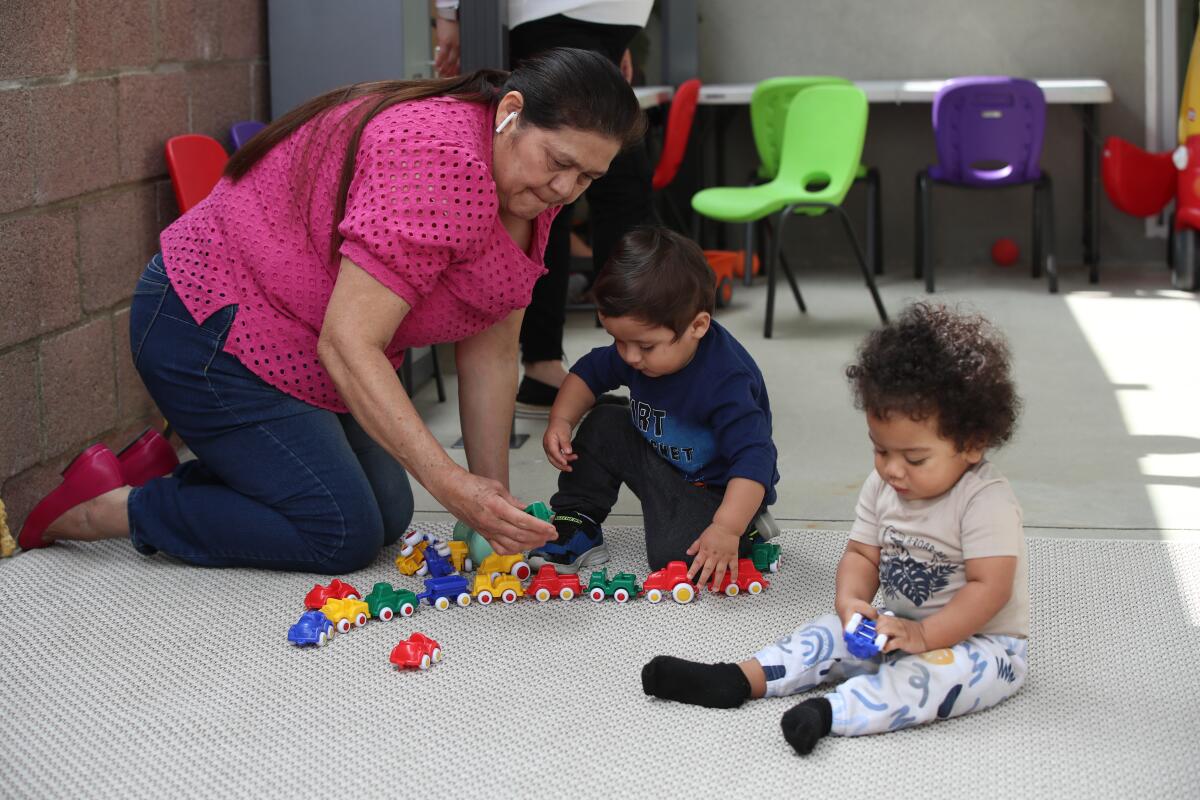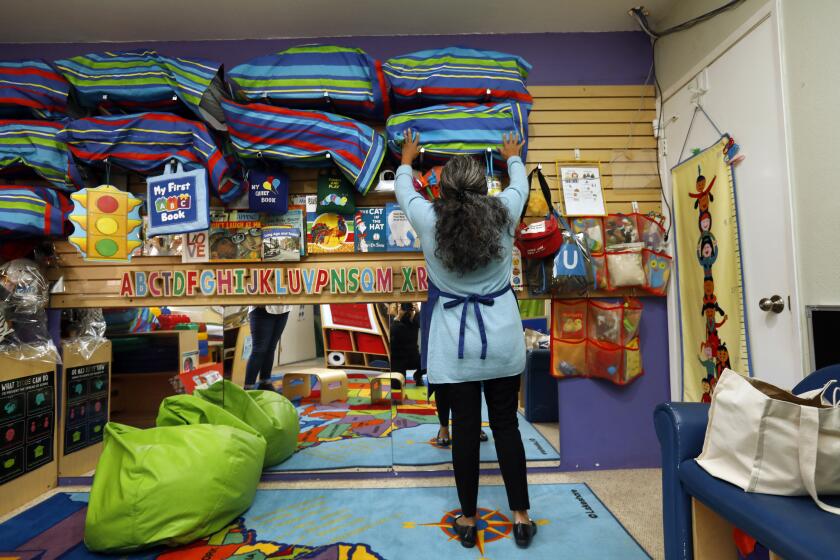Federal funding for child care is about to fall off a cliff. Why that’s a disaster

- Share via
On Saturday, $39 billion in federal child-care funds made available through the American Rescue Plan Act are set to expire. As a result, close to 3.2 million children could lose their spots in early education programs. Congress can solve this problem. So far, however, it has declined to do so, starting with deciding not to pass the Build Back Better provisions in 2022 that would have made child-care funding permanent.
Inaction has consequences. Families who have relied on this assistance since the COVID-19 pandemic will face tough choices. They could see their child-care costs increase by 15% or more. Instead of paying these fees, they might have to choose to reduce their work hours or leave the workforce altogether.
This will come as a second blow to families who lost a measure of financial stability when Congress allowed the Child Tax Credit to expire in 2022, a decision that caused the rate of child poverty to more than double in one fell swoop — the largest year-to-year increase in U.S. child poverty on record.
More than 3 million children may lose their spots in day-care centers after federal child-care funding from the pandemic era expires Sept. 30.
The American Rescue Plan Act supported child care in two ways: It allowed states to expand financial support to families directly, and it provided funding to early education programs to stay open amid economic instability. When these funds run out, more than 70,000 programs across the country are likely to close, according to an analysis by the Century Foundation.
Throughout the pandemic, states additionally used American Rescue Plan Act funds to increase the salaries of early educators, who are often paid poverty wages. We have long known that the early education sector is a failed market endeavor — treating it like a private good has neither yielded a profit for programs nor made it less expensive. The cost of care outpaces what families can afford and what providers can pay their staff.
The cliff effect from this funding’s expiration may exacerbate this problem, as some programs will have to choose between closing entirely, cutting staff wages and increasing the costs families pay by thousands of dollars per year.
Early childhood educators make an average of $11.65 an hour. One-time federal relief dollars can’t fix this degree of structural income inequality.
For the workforce and economic productivity at large, the lack of a solid child-care infrastructure introduces more instability, particularly for women. Early education is already an understaffed field of primarily female employees; these workers often leave the profession because they make on average about $13 an hour and can’t support themselves on such unjust wages. Beyond the field, many workers in general can’t find safe and affordable child care that meets their children’s needs, and so they — again, most often women — must opt out of the workforce.
None of this is good for the economy or our shared prosperity, and other recent decisions by the federal government have made the lives of working families more difficult.
For instance, the American Rescue Plan Act funding expires one day before federal student loan payments are set to resume, following the Supreme Court’s rejection of the Biden administration’s loan forgiveness plan. The court’s 2022 decision to overturn Roe vs. Wade, allowing states to restrict access to abortion, will force many people — particularly Black and Latina women and women living in poverty — to have children when they are unprepared to do so. The lack of child care programs will make life harder still. Many Americans would be justified in feeling like their government is not only failing them but actively seeks to punish them.
It’s unacceptable that parents spend more on childcare than on housing in most of California. Families shouldn’t have to go broke raising the next generation of taxpayers.
This crisis is not without a solution. Child care is a linchpin of our economy and modern society, and understanding that early education is essential infrastructure illuminates a path forward. We are a nation of builders — we lifted the country out of a Depression in the 1930s by building bridges, ensured economic growth in the 1950s by creating an interstate highway system, and in 2021 passed a law to fund clean energy, broadband access and other infrastructure.
We can in turn build an equitable, affordable and high-quality early education system in this country. This agenda is supported by the 93% of voters who believe it’s important for working parents to be able to find and afford quality child care for their young children.
It simply entails continuing the work that studies show to have resulted from the American Rescue Plan Act: stabilizing the existing supply of child-care programs across the country, creating new supply that meets the needs of working families by making care no- or low-cost, and raising compensation for early educators to a professional wage.
There are multiple viable proposals before Congress to stabilize the sector. Democratic and independent lawmakers introduced a bill in the House and Senate that would provide $16 billion in mandatory annual funding for five years to continue the grants implemented by the American Rescue Plan. Republicans have proposed to double the Child Care and Development Block Grant, the primary federal funding stream that helps families afford child care, over five years, which would increase this funding stream to $16 billion by 2028.
These ideas are strong starting points — but insufficient on their own. This country is in dire need of a permanent federal policy on early education, as Build Back Better was intended to be. Congress should invest in families and workers now by recognizing early education as essential infrastructure for our success as a nation.
Rebecca E. Gomez is a program officer at the Heising-Simons Foundation.
More to Read
A cure for the common opinion
Get thought-provoking perspectives with our weekly newsletter.
You may occasionally receive promotional content from the Los Angeles Times.












